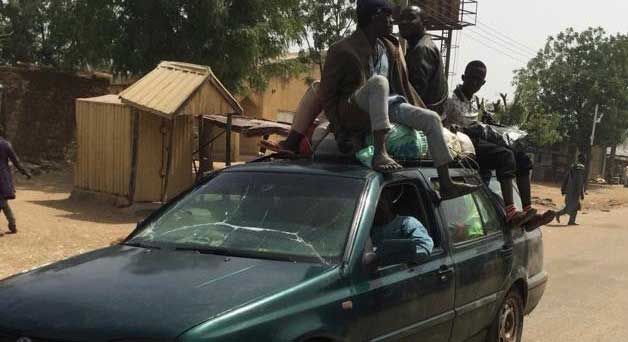Zamfara Emir, Residents Displaced Despite Multiple Pleas For Security
Among those the emir of Rafin Tofa, Zamfara, Northwest Nigeria, reached out to several times, as terrorists sucked them dry of their hard earned resources, was Alhaji Mamman Bawa Tsafe, the state's Commissioner for Security and Home Affairs.

Alhaji Isa Abubakar, the emir of Rafin Tofa, a village in Zamfara State, Northwest Nigeria, said the government abandoned his town to terrorist invasion, despite the fact that he repeatedly drew their attention through various distress messages.
Emir Abubakar, who is currently living among his displaced people in Gusau, the capital of Zamfara, had made various contacts, phone calls, and official visits to explain their situation to authorities at the local and state levels, but there was no positive response.
Tofa, he said, has become a ghost town with no one in it because the residents have nothing to offer the terrorists who tax them. “We initially paid the terrorists two million naira to allow us to harvest our farmlands,” he explained. “That was before they imposed a new tax on us.”
The emir had faced repercussions after speaking out against their operations, which resulted in his kidnapping. Three terrorists stormed his home and whisked him away after learning about his activities.
“They took me to a forest close to Tsafe,” he continued. The terrorists and his family later agreed to a million naira ransom. “However, they stated that even if the ransom is paid, they will not release me.” But he was later set free after being warned to stop trying to cooperate with the government.
A copy of a letter he sent to Alhaji Mamman Bawa Tsafe (rtd), Zamfara State Commissioner for Security and Home Affairs, in Dec. 2021, detailed how Tofa residents were cooperating with terrorists who claimed they turned the town into their destination, creating roadblocks for their criminal activities.

“They turned our town into a roadblock, stopping people, and confiscated their property,” the letter stated.
“They kidnap bystanders and murder others. This has put us in a difficult situation in which people accuse us of cooperating with them despite the fact that we are also victims.
“They impose a ransom tax on us. We initially paid two million naira, followed by a payment of 200 thousand naira. And our people now have nothing to offer.
“The gunmen have promised that if we do not pay them, they will come and kill or kidnap anyone who crosses their path.”
In the letter, the emir then requested military presence in the town and promised that the people would support security personnel in any way they could.
But they did not receive the support they sought. Not even after Abubakar followed up with several phone calls before they were displaced.
“I personally went to the authorities and spoke with them. I also met with the vice chairman of Gusau Local Government Area (LGA) and, after speaking with him, I gave him a letter.
“We then went to the Commissioner for Security for the second time, and we were also promised that our situation would be under control,” he explained.
When HumAngle contacted the Zamfara Commissioner for Security and Home Affairs, he confirmed receipt of the letter and added that he forwarded the emir’s request to relevant security agencies in a separate letter.
When asked the particular person and body he reached out to, Tsafe refused to reveal precise information, but assured that he had already begun working with the state’s security stakeholders to provide military presence in Tofa and other locations with similar problems.
However, while waiting for a security presence, the people of Tofa received a warning from soldiers who were there to respond to an attack.
According to some residents, the terrorists invaded and raped women and girls in broad daylight on Jan. 28, 2022, after demanding payment for the tax they imposed.
The residents added that they couldn’t do anything because the terrorists possessed superior weapons that could jeopardise their lives if they resisted. They stayed in the town for several hours until soldiers on motorcycles arrived.
The soldiers were able to chase the terrorists out right away. “A captain among the soldiers was surprised that only two officers were able to chase away the terrorists while the entire village was unable to,” a resident said.
“He then threatened that if anything bad happened in the village, he would not spare anyone.”
According to the residents, this, combined with the threat of terrorists, forced them to flee the town and relocate to safer areas. They attempted to return home several times but were unsuccessful.
Support Our Journalism
There are millions of ordinary people affected by conflict in Africa whose stories are missing in the mainstream media. HumAngle is determined to tell those challenging and under-reported stories, hoping that the people impacted by these conflicts will find the safety and security they deserve.
To ensure that we continue to provide public service coverage, we have a small favour to ask you. We want you to be part of our journalistic endeavour by contributing a token to us.
Your donation will further promote a robust, free, and independent media.
Donate HereStay Closer To The Stories That Matter




